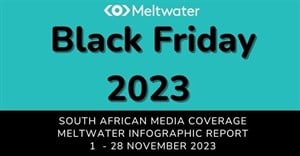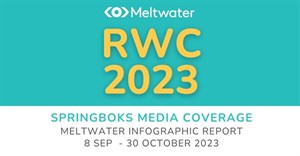Trending
Elections 2024
Jobs
- Communications Manager George
- Coordinator - Marketing and Communications Johannesburg
- Printing Business Manager Polokwane
- Copywriter Johannesburg
- Copywriter Cape Town
- Account Manager, Producer and Field Producer Parkhurst
- Production Manager Johannesburg
The renaissance of (traditional) PR: Data-driven PR in the era of ChatGPT and the trust economy
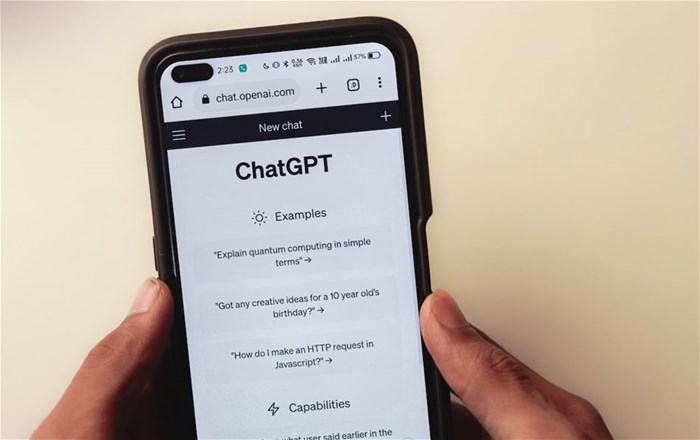
With a data-driven approach, PR strategies and campaigns can be optimised, their success better measured and analysed, and their target audiences identified so that messages are received correctly. In today's competitive PR landscape, a data-driven approach helps PR experts make informed decisions and achieve better results for their clients. While data analysis can provide valuable insights, the human components of public relations, such as relationship building and interpersonal communication, remain essential and crucial to the long-term success of PR campaigns. This human component is particularly important in the 'trust economy', which places the most relevance on having experts who help customers navigate the complex media environment alongside the development of economics, culture, and politics in a world of overwhelming and constantly changing information. The idea behind the trust economy becomes especially important in times of technological progress such as ChatGPT. Ultimately, while AI-powered tools have undeniable benefits for data-driven PR, they do not replace the expertise and experience of PR professionals, who are able to build and maintain trust and credibility. Indeed, what it comes down to is finding the right equilibrium and using new tools, such as ChatGPT in a healthy balance with traditional, interpersonal PR skills. To understand why it is human expertise and skill sets that can be replaced by AI, we must first take a look at the evolution and thus the integration of data and AI in PR.
The evolution of the PR
In recent years, PR has moved further away from traditional media work and more towards digital and social media. With the onset of data-driven campaigns, PR professionals can now benefit from the infinite amount of information available through social and digital channels. With the help of data analysis tools and techniques, PR experts gain a deeper understanding of the market or industry's media landscape and can target their messages more effectively. These tools include social listening and media monitoring tools, which give PR experts a detailed and deeper overview, enabling them to optimise ongoing campaigns and improve future ones. Data and media monitoring, tracking engagement rates and reach, and other tools of data-driven PR campaigns allow PR experts to identify relevant target audiences and tailor pitches to reach the right readership, specialised in specific industries or topics. The insights provided by these data sets has significantly improved the efficiency and effectiveness of PR, allowing PR professionals to gain a deeper understanding of the interests and sentiments of their target audiences and build trust and credibility – the cornerstones of the trust economy. So, what role does AI specifically play in data-driven PR, and how does it change the game?
AI in PR
With PR’s digital transformation comes the integration of AI, which while it is another step forward, it’s one that should be approached with caution. One major advantage of AI is that it can automate routine tasks such as media monitoring, sentiment analysis, and social media management. This allows PR professionals to focus more on strategic tasks such as developing campaigns and building and maintaining interpersonal relationships. For data-driven PR campaigns, AI is an important addition as AI-powered tools can analyse data faster and more accurately, providing valuable insights into target audiences, campaign performance, and industry trends. One particularly important advantage that AI offers the PR industry is the ability to personalise communication and make key messages more effective. By analysing large amounts of data, AI-powered tools can recognise patterns, preferences, and general trends and sentiments of target audiences. The result of targeted and guided communication: higher engagement and better campaign results. That being said, the integration of AI is not without its concerns and for many, represents a double-edged sword.
One of the main problems with AI is the potential bias of AI algorithms, which can perpetuate existing stereotypes and discrimination, in some cases even exacerbate them. There is also growing concern that too much reliance on AI could lead to a loss of human creativity and judgment, as seen with ChatGPT able to take over many tasks necessary in PR. Another major concern is data privacy and security, as AI-powered tools capture huge amounts of data. While the use of AI in PR poses risks, it also offers numerous benefits. As AI continues to evolve and change, it is important to be aware of the advantages and risks of these tools. As mentioned previously, it is crucial to recognise that while data and AI are beneficial additions to the PR toolbox, they should not be viewed as substitutes for human expertise.
The importance of PR experts in the trust economy
Although AI and data analysis can help optimise workflows and improve processes, they cannot replace the experience and insight that professional PR experts provide. AI does not have the ability to understand and navigate the nuances of interpersonal relationships. Data can help identify potential partners or target audiences, but they cannot replace the actual exchange and maintenance of these relationships at the end of the day. It requires the ability to listen, empathise and identify with them on a personal level – a skill AI is unable to replace humans. Here it makes sense to look at how AI is being perceived in the media and more generally, in public discourse. What does the South African discussion surrounding AI look like?
What is the sentiment towards AI in South Africa?
According to media monitoring statistics provided by Meltwater, it appears that the general sentiment towards ChatGPT in connection to PR in South Africa is predominantly neutral, with a positive sentiment of 10.6% and a negative sentiment of 1%. This suggests that while some PR professionals are optimistic about ChatGPT, there is a small percentage that may have reservations or concerns. A keyword search through the media discussion in South Africa sheds light on the words most referred to in relation to the discussion surrounding ChatGPT in PR, with the words below being the most stated. A prominent topic of discussion seems to be Users, as ChatGT provides a platform for PR professionals to optimise workflows however, clients and target audiences are also the new users of ChatGPT which may be a concern for PR professionals. While ChatGPT does offer an avenue of creating content, conducting research and more generally optimising certain processes, it is crucial to remember that these technological advancements do not replace the need for human expertise. Other keywords found focus predominantly on the threat to jobs, with employees and teams and employees standing out. Other words such as social media, digital record, technology and digital content focus more on the mechanics of the platform and suggest that the sentiment, as shown by Meltwater, is rather neutral, as the words are not value-loaded. Indeed, AI-powered tools offer PR experts ways to save time and use their time on different tasks, however it is PR experts themselves that are the most important element in PR work. Seeing as trust and credibility, the cornerstones of the trust economy, can not be created, nor maintained by ChatGPT.
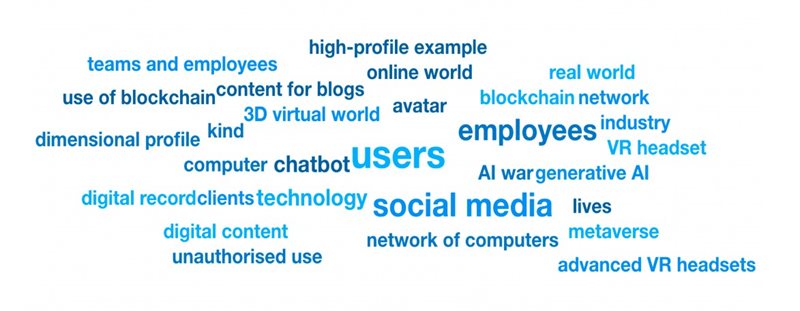
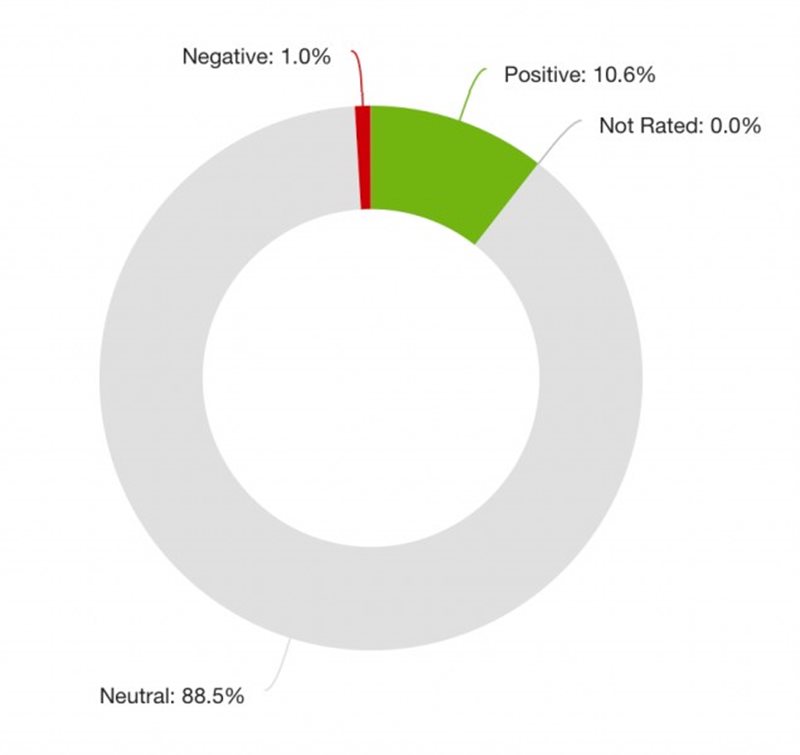
Conclusion
Although new technological innovations such as ChatGPT, data analytics, and AI can help optimise workflows and improve processes; trust, human understanding, and credibility remain the cornerstones of PR and the trust economy. Data-driven PR strategies can help overcome the industry's guessing game and revolutionise the entire field. However, to fully leverage the potential of these approaches, the experience, insights, and interpersonal relationships of people in the industry are indispensable. The key is to find the right equilibrium and to utilise AI-powered tools to optimise the data part of data-driven PR, while maintaining and building on the interpersonal human element that is PR. It is this human element that is crucial for building trust, which is essential for long-term success in the PR industry. Data-driven tools improve PR strategies and allow for a 'work smart' mentality by improving certain processes and saving time, but they cannot replace the exchange with their clients, target audience, and like-minded individuals.
Read more about the best tips, tricks and strategies for PR in the digital age in our latest guide: Guide to modern PR.
About Katherine McInnes
Katherine McInnes is head of Marketing, Africa at Meltwater.- South Africa’s digital landscape maturation in 2024: Insights from the 2024 Global Digital Report27 Mar 14:09
- Black Friday media coverage 202301 Dec 12:19
- Springboks media coverage at the RWC 202302 Nov 09:23
- How to use technology to prepare for Black Friday01 Nov 13:00
- B2B and TikTok - more compatible than expected?05 Sep 11:34


















